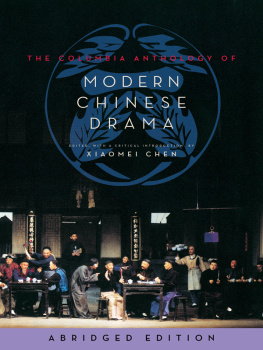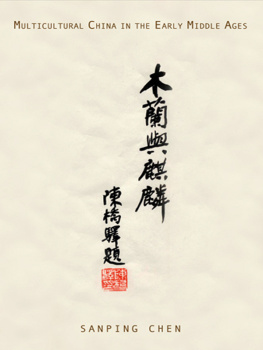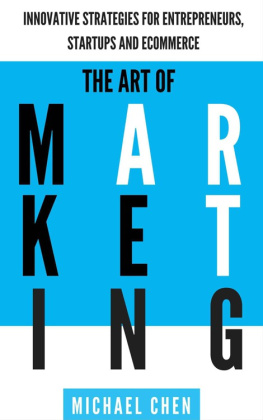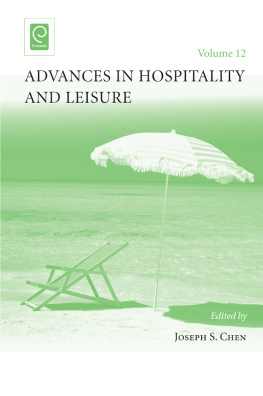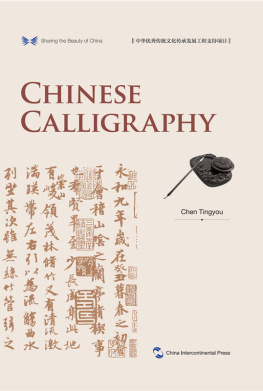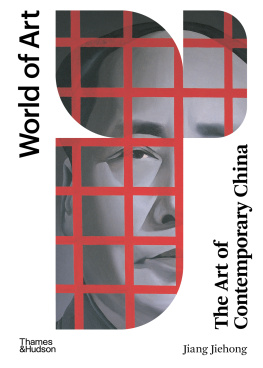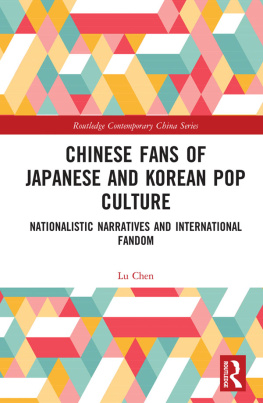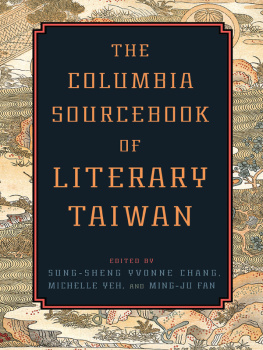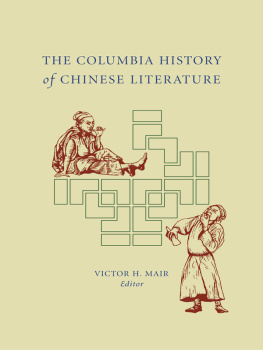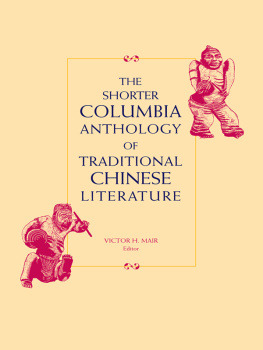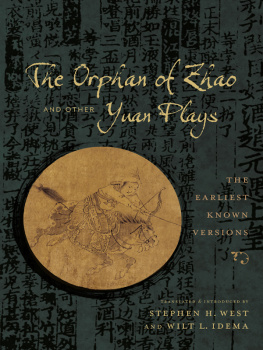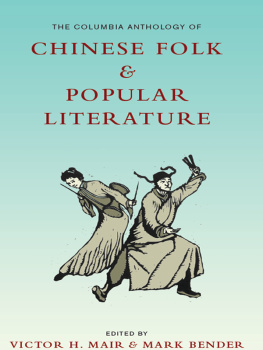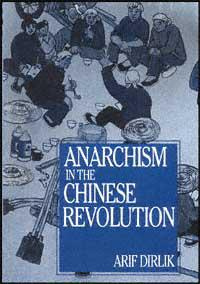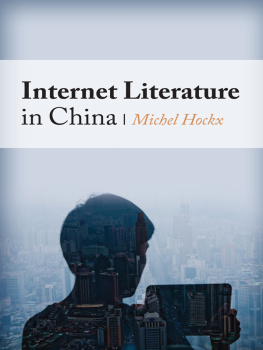The Columbia Anthology of Modern Chinese Drama
ABRIDGED EDITION
WEATHERHEAD BOOKS ON ASIA
Weatherhead Books on Asia
Weatherhead East Asian Institute, Columbia University
A complete list of books in this series appears in
The Columbia Anthology of Modern Chinese Drama
ABRIDGED EDITION
Edited, with a critical introduction, by Xiaomei Chen
COLUMBIA UNIVERSITY PRESS
NEW YORK
This publication has been supported by the Richard W. Weatherhead Publication Fund of the Weatherhead East Asian Institute, Columbia University.
Columbia University Press
Publishers Since 1893
New York Chichester, West Sussex
cup.columbia.edu
Copyright 2014 Columbia University Press
All rights reserved
E-ISBN 978-0-231-53554-0
Library of Congress Cataloging-in-Publication Data The Columbia anthology of modern Chinese drama / edited, with a critical introduction, by Xiaomei Chen. Abridged edition.
p. cm.
ISBN 978-0-231-16502-0 (cloth : alk. paper) ISBN 978-0-231-16503-7 (pbk.) ISBN 978-0-231-53554-0 (electronic)
1. Chinese drama20th centuryTranslations into English.
I. Chen, Xiaomei, 1954- editor of compilation.
PL2658.E5C65 2013
895.12508dc23
2012044657
A Columbia University Press E-book.
CUP would be pleased to hear about your reading experience with this e-book at .
Jacket image: 1992 performance of Lao Shes 1958 play Teahouse to celebrate the 40th anniversary of the founding of the Beijing Peoples Art Theatre (photograph courtesy of Beijing Peoples Art Theatre).
Jacket design: Kathleen Lynch/Black Kat Design
References to websites (URLs) were accurate at the time of writing. Neither the author nor Columbia University Press is responsible for URLs that may have expired or changed since the manuscript was prepared.
To the generations of Chinese playwrights and theater artists, and the translators, whose talents and spirit have given birth to this anthology
CONTENTS
translated by Edward M. Gunn
translated by Jonathan S. Noble
translated by Jonathan S. Noble
translated by John B. Weinstein and Carsey Yee
translated by Paul B. Foster
translated by Wang Tso-liang and A. C. Barnes, revised translation by Charles Qianzhi Wu, with a translation of prologue and epilogue
translated by George Hayden
translated by Ying Ruocheng, revised by Claire Conceison
retranslated by Amy Dooling
translated by Constantine Tung and Kevin A. OConnor
translated by Brenda Austin and John B. Weinstein
translated by Shiao-Ling Yu
translated by Kirk A. Denton
I am deeply indebted to the brilliant playwrights and their generous children and relatives for granting the English translation rights for this anthology and to the talented translators, who put aside their own important work to contribute to the making of this anthology.
I thank Edward M. Gunn for his early support of the project and for his permission to include two plays from his pioneering anthology Twentieth-Century Chinese Drama (Bloomington: Indiana University Press, 1983), The Main Event in Life and Under Shanghai Eaves. I am grateful to Indiana University Press for permission to reprint them. I am indebted also to Shiao-Ling Yu and the Edwin Mellen Press for granting permission to include The Bus Stop, originally published in 1996 in Chinese Drama After the Cultural Revolution, 19791989. I thank the University of Hawaii Press for its permission to include Jiang Qing and Her Husbands, first published in 2003 in Reading the Right Text. I express my gratitude to Foreign Languages Press, Beijing, for permission to revise the translation by Wang Tsuo-liang and A. C. Barnes of Cao Yus Thunderstorm (1958, 1978) and the translation by Foreign Languages Press of Tian Hans (1961).
I thank Jennifer Crewe, Columbia University Press editorial director, for her unstinting support of this project and for her professionalism, efficiency, and perseverance in guiding me through a long process; I am especially grateful for Jennifers advocacy for this abridged edition to further introduce modern Chinese plays to university classrooms and the general reader. I am grateful to the six anonymous external reviewers who advised me in connection with making the difficult decision of which plays to include in this abridged edition. I thank the copy editor, Mike Ashby, for his patience, skill, tireless efforts, and editorial decision to convert the format of each play in accordance with standard publishing practices for plays in English, and Leslie R. Kriesel, assistant managing editor, for her understanding, timely communication, and professional skills. I am indebted also to the College of Humanities, Ohio State University, for the Seed Grant to start this project, to the University of California, Davis, for a publication subvention grant for the original edition, and to Victor Mair, for his early support of the project. I am grateful to my teacher, Marvin Carlson, and to my friends and colleagues Kirk A. Denton, Patricia Sieber, Marvin Carlson, Judy Andrews, Kuiyi Shen, Timothy Wong, Michelle Yeh, David Der-wei Wang, Chengzhi Chu, Ban Wang, Xiaobing Tang, Barbara Mittler, Wendy Larson, Lindsey Jones, Chia-ning Chang, Smriti Srinivas, Susan Mann, Beverly Bossler, Clair Conceison, Thomas E. Postlewait, and to many other people for their support and encouragement. I thank my students of the past twenty years, who shared my interest in modern Chinese theater and culture; they, too, have contributed to this anthology.
Last but not least, I am indebted to Mark Halperin for his love and his faith in me, and to Miriam Halperin for her pictures and Mothers Day greetings executed on the backs of manuscript pages piled up around the house for years.
XIAOMEI CHEN
Having taught modern Chinese spoken drama (
These thirteen plays illustrate the historical, cultural, and aesthetic traditions of Chinese drama in the twentieth century and the formation of Chinese national and gender identities and their relationships to the West through the looking glass of theater and performance. Modern Chinese drama came on the Chinese stage at the turn of the twentieth century in imitation of the plays of the Western Ibsenesque tradition. Hua simply means spoken language and ju, drama. In contrast to Chinese operatic theater, which combines singing, speaking, acting, and acrobatics, Chinese spoken drama, like its Western counterpart, consists mostly of speaking and acting, although dramatists in the later periods experimented with music, singing, and dancing in an attempt to combine the traditions of both the East and the West.
The development of modern Chinese drama could not have affected cultural and political history so profoundly without having benefited directly from the late Qing dynastys operatic reform as advocated by Liang Qichao. Along with his theories of a novelistic revolution and a poetic revolution, Liang initiated reform ().
Liang Qichaos operatic reform resulted in two distinctive features that affected the development and status of modern Chinese drama. First, Liang transformed the traditional view of ).
The newly reformed operas (gailiang xinju) became an innovative means of transmitting an ideology directed at bringing about revolutionary changes while benefiting from an existing broad audience at the grassroots level drawn to the traditional form of operatic art. The operas also benefited from new performance spaces, such as the New Stage (

